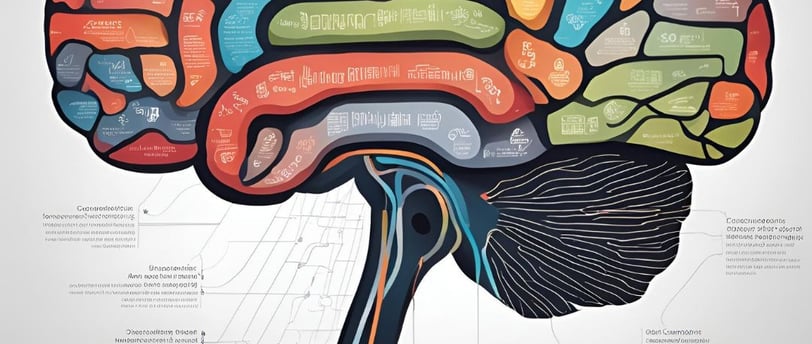Psychology in Action: A Guide to Applying Theories and Concepts
Psychology books offer incredible insights into human behavior, emotions, and mental processes. Whether you’re a beginner or a professional, there’s a book that can help you understand yourself and others better. By choosing the right books, using active reading strategies, and applying lessons to daily life, you can make psychology an accessible and enriching subject. So, grab a psychology book today and start exploring the fascinating world of the human mind!
PSYCHOLOGY
kanav pareek
2/6/20256 min read


Psychology books offer a gateway to understanding the human mind, behavior, and emotions. They provide valuable insights into how people think, make decisions, and interact with others. Whether you want to improve your personal growth, enhance your relationships, or gain a deeper understanding of mental health, psychology books can be an invaluable resource.
However, many people find psychology books overwhelming due to complex theories and technical jargon. This article will guide you on how to easily understand psychology books, choose the right ones, and apply their lessons to everyday life.
Why Read Psychology Books?
Psychology books are more than just academic resources; they are tools for self-improvement and deeper understanding. Here’s why you should consider reading them:
1. Enhancing Self-Awareness
Psychology books help you explore your own thoughts, emotions, and behaviors. By understanding how your mind works, you can identify patterns that may be affecting your decisions and relationships.
2. Understanding Relationships and Communication
Many psychology books focus on improving interpersonal skills, communication, and emotional intelligence. They can help you develop better relationships, whether in personal life or professional settings.
3. Gaining Insights into Mental Health
Books on psychology offer knowledge about mental health issues like anxiety, depression, and stress management. They can help individuals recognize symptoms, understand coping mechanisms, and support others going through mental health struggles.
Types of Psychology Books
Psychology books come in different categories, each serving a unique purpose. Understanding these types can help you choose the best book for your needs.
1. Academic Psychology Books
Written by scholars and researchers
Often used in university courses
Contain in-depth studies and scientific research
2. Self-Help Psychology Books
Focus on practical applications
Easy to read and understand
Help with personal growth and self-improvement
3. Popular Psychology Books
Written for general audiences
Blend psychological research with storytelling
Examples include “Atomic Habits” and “The Power of Habit”
4. Clinical Psychology Books
Target professionals in the field
Cover therapy techniques and mental health treatments
Useful for psychologists, therapists, and counselors
How to Choose the Right Psychology Book
With thousands of psychology books available, selecting the right one can be challenging. Here’s how to make the right choice:
1. Identify Your Interests
Do you want to learn about mental health, human behavior, or self-improvement? Knowing your goal will help narrow down your options.
2. Check the Author’s Credentials
Look for books written by experts, psychologists, or researchers with credible backgrounds. A qualified author ensures accuracy and reliability.
3. Read Reviews and Summaries
Before purchasing a book, check reviews on platforms like Amazon or Goodreads. Reading summaries or sample pages can give you an idea of the writing style and content.
Best Psychology Books for Beginners
If you’re new to psychology, start with these beginner-friendly books:
1. “Thinking, Fast and Slow” by Daniel Kahneman
Explains how our brain makes decisions using two systems: fast, intuitive thinking and slow, rational thinking.
2. “The Power of Habit” by Charles Duhigg
Explores how habits are formed and how they can be changed for personal and professional growth.
3. “Influence: The Psychology of Persuasion” by Robert Cialdini
Teaches how persuasion works and how people can influence decisions in everyday life.
Understanding Key Psychological Concepts
Psychology covers a vast range of concepts, but here are some fundamental areas:
1. Cognitive Psychology
Studies how people think, learn, and remember. It explores decision-making, problem-solving, and perception.
2. Behavioral Psychology
Focuses on how behavior is learned through experiences and environment. Includes studies on habits, conditioning, and reinforcement.
3. Social Psychology
Examines how individuals behave in social settings. Topics include conformity, group behavior, and influence.
4. Psychoanalysis
Developed by Sigmund Freud, this theory delves into unconscious thoughts and how they shape behavior.


Making Psychology Books Easier to Understand
Psychology books often contain complex theories and scientific terminology, which can make them difficult to grasp. However, with the right approach, you can simplify the learning process and absorb the key concepts effectively.
1. Use Active Reading Strategies
Ask Questions: Before starting a book, think about what you want to learn from it. Write down questions and look for answers as you read.
Highlight Key Points: Use a highlighter or sticky notes to mark essential concepts, definitions, and theories.
Summarize Chapters: After finishing a chapter, write a brief summary in your own words to reinforce your understanding.
2. Take Notes and Create Mind Maps
Break down complex ideas into bullet points or diagrams.
Use visual aids like charts or flowcharts to map out psychological theories.
Write short explanations for terms you don’t understand and revisit them later.
3. Relate Concepts to Real-Life Experiences
Apply psychological theories to everyday situations.
Think about past experiences and how they relate to what you’re learning.
Discuss concepts with friends or family to deepen your understanding.
Common Psychological Theories Explained Simply
Many psychological theories shape our understanding of human behavior. Here are a few explained in simple terms:
1. Maslow’s Hierarchy of Needs
Maslow proposed that human needs are arranged in a pyramid, with basic physiological needs at the bottom and self-actualization at the top. People must satisfy lower-level needs (food, safety) before pursuing higher-level goals (creativity, fulfillment).
2. Pavlov’s Classical Conditioning
Pavlov’s experiment with dogs showed that behaviors could be learned through association. This concept explains how habits and phobias develop.
3. Freud’s Theory of the Unconscious Mind
Freud believed that much of human behavior is influenced by unconscious desires and childhood experiences. He introduced concepts like the id, ego, and superego to explain personality.
Psychology Books for Mental Health Awareness
Mental health is a crucial aspect of well-being, and psychology books can offer guidance and support. Here are some recommended books:
1. “The Anxiety and Phobia Workbook” by Edmund Bourne
Provides practical techniques for managing anxiety, panic attacks, and phobias.
2. “Lost Connections” by Johann Hari
Explores the causes of depression and alternative solutions beyond medication.
3. “The Mindful Way Through Depression” by Mark Williams
Discusses mindfulness techniques to overcome depression and negative thinking.
Psychology Books for Personal Development
If you’re looking to improve yourself, psychology books can help in various ways:
1. Building Confidence and Self-Esteem
“The Six Pillars of Self-Esteem” by Nathaniel Branden explains how self-esteem shapes our lives and how to strengthen it.
“Daring Greatly” by Brené Brown discusses vulnerability and how embracing it can lead to personal growth.
2. Improving Emotional Intelligence
“Emotional Intelligence” by Daniel Goleman explores why emotional intelligence (EQ) is as important as IQ.
“The Gifts of Imperfection” by Brené Brown teaches how to embrace self-acceptance.
3. Understanding Motivation and Habits
“Drive” by Daniel Pink explains what truly motivates people.
“Atomic Habits” by James Clear offers strategies to build good habits and break bad ones.
Applying Psychology Lessons in Daily Life
The knowledge gained from psychology books is useful only if applied in real life. Here’s how:
1. Enhancing Communication Skills
Understand nonverbal cues and body language.
Improve listening skills and empathy in conversations.
2. Understanding Human Behavior in Social Settings
Recognize psychological biases that affect decision-making.
Learn how social influences shape actions and opinions.
3. Applying Psychological Principles in Decision-Making
Use cognitive psychology to enhance problem-solving skills.
Apply behavioral psychology to develop discipline and self-control.
Best Psychology Books for Professionals
Psychology books are not just for students; professionals in various fields can benefit too.
1. Books for Therapists and Counselors
“The Body Keeps the Score” by Bessel van der Kolk (Trauma and healing)
“Man’s Search for Meaning” by Viktor Frankl (Therapeutic insights from Holocaust survival)
2. Psychology Books for Business and Marketing Professionals
“Influence: The Psychology of Persuasion” by Robert Cialdini (Marketing and sales strategies)
“Thinking, Fast and Slow” by Daniel Kahneman (Consumer decision-making)
3. Books for Educators and Teachers
“Mindset” by Carol Dweck (Growth mindset in education)
“Grit” by Angela Duckworth (The role of perseverance in learning)
Psychology Books vs. Online Resources
Should you rely on books or online resources for psychology knowledge? Let’s compare:
FeaturePsychology BooksOnline ResourcesDepth of KnowledgeIn-depth analysis and researchBrief summaries and articlesReliabilityAuthored by experts and professionalsVaries; may contain misinformationBest ForLearning complex theories in detailQuick overviews and latest trends
Challenges in Understanding Psychology Books
Even with the best books, some challenges may arise:
1. Complex Terminology and Concepts
Use a glossary or dictionary for unfamiliar terms.
Read simplified summaries before diving into complex books.
2. Overcoming Information Overload
Read in small sections rather than all at once.
Take breaks to absorb and process information.
3. Staying Consistent in Reading and Applying Knowledge
Set a reading schedule (e.g., 20 minutes daily).
Discuss ideas with others to reinforce learning.
Conclusion
Psychology books offer incredible insights into human behavior, emotions, and mental processes. Whether you’re a beginner or a professional, there’s a book that can help you understand yourself and others better. By choosing the right books, using active reading strategies, and applying lessons to daily life, you can make psychology an accessible and enriching subject.
So, grab a psychology book today and start exploring the fascinating world of the human mind!
FAQs
1. What is the best psychology book for beginners?
“Thinking, Fast and Slow” by Daniel Kahneman is an excellent starting point for beginners.
2. Can psychology books improve mental health?
Yes, books on mindfulness, emotional intelligence, and therapy techniques can help manage stress and anxiety.
3. How do I understand difficult psychology books?
Use active reading strategies, take notes, and relate concepts to real-life experiences.
4. Are self-help psychology books effective?
Yes, as long as they are based on scientific principles and written by credible experts.
5. Where can I find free psychology books?
Websites like Project Gutenberg, Open Library, and university archives offer free psychology books.
Blog
Content
Engage
contact@growthtimewithme.com
© 2024. All rights reserved.
